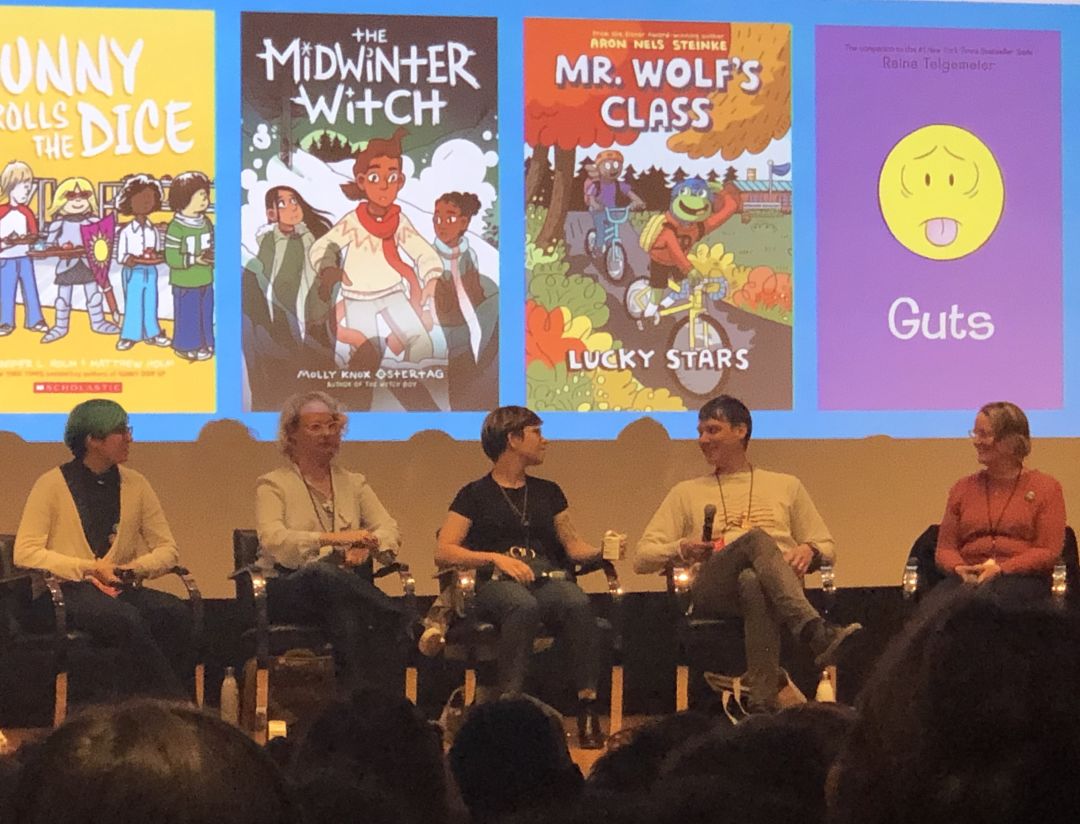YA Graphic Novelists Owned the Portland Book Festival This Weekend

Raina Telgemeier, Jennifer Holm, Molly Osterstag, Aron Nils Steinke, and Gale Galligan at the Whitsell.
Image: Julia Silverman
The FOMO kicked in early at the Portland Book Festival this year. You could see it on the anxious faces of hundreds of grade-schoolers who stormed the Portland Art Museum bright and early Saturday morning, hoping to snag a coveted seat in the Whitsell Auditorium for a panel of YA graphic novel stars, including the beloved Raina Telgemeier, whose debut memoir Smile helped when it was first published almost a decade ago. (Her most recent offering, Guts, just published by Scholastic, had a first printing of a million copies.)
Note to Book Festival organizers: next year, the superstars need a way bigger room, though kindly volunteers asked one adult from each two-parent family to give up their seat so more kids could pile in and hear from their heroes.
It was worth the squeeze. Telgemeier was joined on stage by Jennifer Holm, whose most recent book, illustrated by her brother, is the delightful Sunny Rolls the Dice, about a child of the 1970s who’d rather spend her babysitting money on Dungeons and Dragons minis than Gloria Vanderbilt jeans; Molly Ostertag, whose Witch Boy trilogy centers on a band of magical misfits; and Gale Galligan, who is lovingly adapting mid-’80s-early-‘90s staple The Babysitters Club into graphic form. The panel was rounded out by Woodstock Elementary School fourth and fifth grade teacher Aron Nels Steinke, whose well-received Mr. Wolf’s Class series draws on the Pacific Northwest and his students for inspiration. (Steinke brought the house down on Saturday with an anecdote about a joke he’d adapted for his book after a student came into the classroom on a chilly Portland morning complaining about his “frozen nuts” — then opened his palm to show off the frost-tinged acorns he’d gathered on his way to school.)
All five authors hit relatable notes for a generation of kids being raised on Marvel movies, Studio Ghibli and (still, always) the great Calvin and Hobbes. Galligan could have been one of the kids in the audience when she described her love for Yu-gi-oh and Pokemon, and the enormous influence of Japanese manga on her work. Ostertag reminisced about the live action role play (LARP) camps she attended as a child and their echoes in her artwork, familiar territory for any Portland kid who has ever been to the wildly popular summer camps offered by Trackers Earth.
And in an age where we’re all pretty much anxious about something all of the time, Telgemeier matter-of-factly told her young audience that they weren’t alone in feeling scared and out-of-control sometimes, and put in an always-welcome plug for therapy without shame.
The lines were nearly as long—but the venue larger, and the average audience age older—in the afternoon for a panel featuring author/illustrators Faith Erin Hicks and Jennifer Dugan, and superstar novelist Rainbow Rowell of Eleanor and Park and Wayward Son fame. Rowell and Hicks have teamed up on Pumpkinheads, a graphic novel for tweens and teens. Their book, like Dugan’s, is set in a theme park(ish) atmosphere and explores love, friendship and gender identity. (Take note, young readers: queer themes are enjoying a welcome and long overdue spotlight moment in graphic noveldom. In addition to the Hicks/Rowell collaboration, Pumpkinheads, check out The Prince and the Dressmaker by Jen Wang, Check, Please! by Ngozi Ugazu, and Spinning by Tillie Walden.)
The Omaha-based Rowell, an MVP at this year’s Book Festival who toplined two separate panels, was generous with her jokes and her prose alike, disclosing that she likes to work recipes worthy of Netflix’s Nailed It! into her books and then track reader attempts to replicate them on social media. In Pumpkinheads, for example, the characters consume “two pieces of pumpkin pie with vanilla ice cream in the middle, dipped in chocolate. On a stick.” And on choosing to set her book in the fall, she mused: “I love the feeling of being on the cusp of change. Like fall—you can’t even keep up with it, and then it’s gone.”
All three, too, dispensed practical advice to young would-be writers in the audience. Dugan, the author of the queer romance Hot Dog Girl, answered a question on how she comes up with her character names by deadpanning, “I think of anyone who wronged me in high school, and those are the bad guys. I’m not kidding.” (She also suggested “‘staying off Goodreads”, FWIW.)
But it was Hicks, perhaps, who had the advice that will linger longest for a young audience of book lovers, doodlers, dreamers, and scribblers.
“I had this insane idea of what it would be like to be an author,” she said, a world in which she’d rub elbows daily with the likes of Steven Spielberg. “The reality is that you are making art, and not everyone is going to love it. But if you are fortunate, enough people will love it, and you can continue to do it.”




